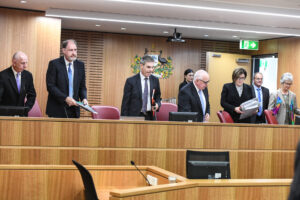While overall wages grew in line with inflation in the June quarter for workers in most industries real wages are still going backwards.
The best news from the June quarter wage price index is that average wages rose 0.8% – the same as inflation. This means that after 11 consecutive quarters, real wages have finally stopped falling.
That is the good news, but as Policy Director, Greg Jericho noted in his Guardian Australia column, for most workers real-wages kept falling. Only good wage growth in construction, mining, transport and warehousing, and the utility industries enabled the overall growth to be equal with inflation. For workers in all other industries, real wages kept falling.
And for all workers, real wages in the past year have fallen sharply and are around 5.4% below where they were before the pandemic.
These latest figures only serve to reinforce that wages are not driving inflation and there is no sign at all of a wages breakout. Indeed, annual wage growth fell in the June quarter to 3.6% from 3.7%.
It highlights that we do not need unemployment to rise to 4.5% in order for inflation to get under the RBA’s 3% target ceiling. The current rate is more than consistent with long-term inflation of between 2% and 3%. Any further efforts to raise unemployment by increased interest rates would only hurt workers and households for no benefit.
You might also like
The continuing irrelevance of minimum wages to future inflation
Minimum and award wages should grow by 5 to 9 per cent this year
Want to lift workers’ productivity? Let’s start with their bosses
Business representatives sit down today with government and others to talk about productivity. Who, according to those business representatives, will need to change the way they do things?
Feeling hopeless? You’re not alone. The untold story behind Australia’s plummeting standard of living
A new report on Australia’s standard of living has found that low real wages, underfunded public services and skyrocketing prices have left many families experiencing hardship and hopelessness.


